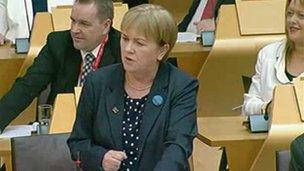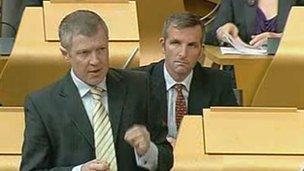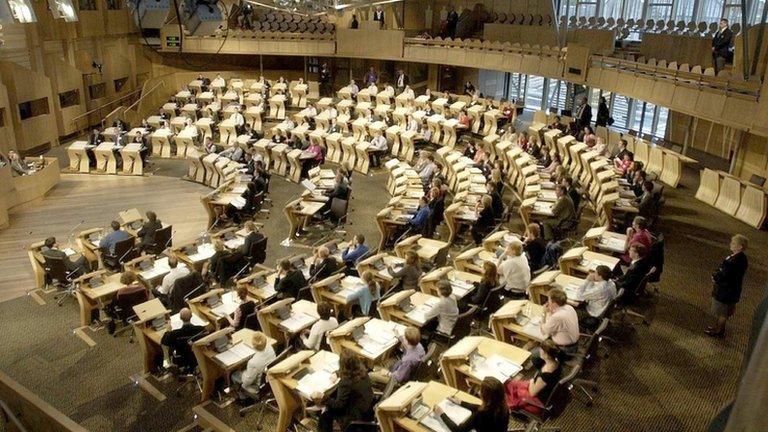First Minister's Questions: Combative, empathetic and disdainful
- Published
We saw three different sides to Alex Salmond today. Or, more precisely, three different approaches to his interlocutors in the chamber.
Responding to Johann Lamont, he was combative. Ruth Davidson drew the approach empathetic. And Willie Rennie? He brought out the disdainful in the First Minister.
There was nothing personal here, you understand. It was simply a factor of the topics raised by the individual leaders concerned. On the day, I found the response to Mr Rennie the most intriguing.
Labour's Johann Lamont was in full satirical mode as she challenged the FM over his notion that an independent Scotland might cut corporation tax in order to attract investment.
Nobody backed him on this, she suggested. Neither business nor the unions. He had one supporter, Jim McColl, whom she dismissed as a tax exile.
She attempted to undermine Mr Salmond's own expert credentials, describing him as a former RBS economist and "pen friend" of Fred Goodwin.
Economic adviser
Then the reveal. Joseph Stiglitz, a member of Mr Salmond's Council of Economic Advisers, had apparently questioned the social value of corporation tax cuts in a speech in Montreal.

It was a combative Alex Salmond who answered Johann Lamont
She reminded Mr Salmond that he had frequently prayed Professor Stiglitz in aid as a Nobel laureate economist. What did he say now?
Mr Salmond said rather a lot - without directly tackling that precise point. He queried whether Ms Lamont was now accepting Professor Stiglitz' views on other issues such as the prospect of a post independence sterling zone.
He noted that Gordon Brown - now spearheading the Labour anti-independence push - had cut corporation tax. He chided Ms Lamont for apparently undervaluing the jobs and investment brought to Scotland by Jim McColl.

Ruth Davidson received an empathetic approach from the FM
He reminded MSPs that the Scottish Government model suggested that a 3p cut in corporation tax would create 27,000 jobs in Scotland and boost GDP by one per cent over the medium term. Did Labour disown such a prospect?
And he repeatedly stressed that the SG strategy, post independence, would be to seek a competitive corporation tax rate - while simultaneously collecting the taxes due. By contrast, he argued, with the approach adopted by the UKG.
The tone then changed markedly - and quite rightly so - with the next topic. Ruth Davidson for the Conservatives eschewed the satire and lampooning of recent weeks and solemnly invited the First Minister to consider the tragedy faced by parents seemingly misled over the disposal of their dead babies' ashes.

Willie Rennie experienced disdain from Alex Salmond
Ms Davidson argued that the existing investigations were insufficient and demanded a full public inquiry, Scotland wide.
Mr Salmond drew a distinction between two forms of inquiry. There was an investigation into past practice in Edinburgh which could extend into other areas. Separately, Lord Bonomy has been tasked with advising on better practice for the future.
The FM sought to dispel Ruth Davidson's claims that parental input was being thwarted or limited. And he insisted there were notable advantages, including pace of action, in the approach adopted by the Government. But he did not entirely rule out a wider investigation, saying that he would look at any case which Ms Davidson might make.
So, the response combative followed by the engagement empathetic. Which brings us to Willie Rennie. He challenged Mr Salmond over plans to close certain Scottish courts.
Some of these citadels of justice, he argued, had been dealing with miscreants for five hundred years or more. Whether that has endeared them to our errant citizenry is a moot point. But, still, the case was made.
The Lib Dem leader said that justice centres had been promised in the stead of the old courts. But there was no precise plan in place for these centres and, worse, it had been suggested that their creation might lead to further court closures.
Spending cuts
Mr Salmond knows that several of his backbenchers are unhappy with these plans or, more precisely, may be struggling to defend them locally.
Perhaps that spawned his notably disdainful approach at first instance to Mr Rennie which consisted of little more than reminding the Lib Dem leader that his party had been roundly beaten at the last election.
Mr Rennie persisted. It was "ridiculous" that there was no fixed alternative in place, with venues for the new justice centres and dates for their creation. It was "cavalier and chaotic".
All of which prompted Mr Salmond to give a more substantive answer. The courts system, he argued, could not be immune from spending cuts - driven, he reminded Mr Rennie, by the Tory/Lib Dem UK coalition.
The aim was to discern the most effective and efficient way of delivering justice. But, still, he could not resist a further disdainful dig. The Lib Dems, he said, used to muster a football team at Holyrood. Now they were reduced to a subs' bench.
Mr Rennie's interventions at question time are strictly limited. So he was unable to retort that sometimes a sub can come off the bench to make an effective contribution.
- Published30 May 2013

- Published28 May 2013

- Published22 May 2013
